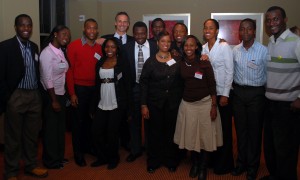The Board of Trustees meetings this past weekend were focused and productive. Most of the discussions centered on Wesleyan’s response to the world economic crisis. As readers of this blog know, because of our endowment decline, we must deal with a significant reduction in revenue. In this economic climate we feel that it is not appropriate to try to compensate for this loss of revenue with a large tuition increase. Instead, we plan on a 3.8% tuition increase for next year—one of the smallest hikes at Wesleyan in decades. We also plan to increase the financial aid budget next year by more than 8%.
The trustees heard how we plan to bridge what now looks to be an emerging $20 million budget gap. I’ve discussed specific cuts in earlier posts and in a letter going out to our alumni today. The links below will take you to those documents. With the continued deterioration of the financial markets, we must be prepared for further, more difficult cuts, and we must redouble our efforts to create more academic programs throughout the summer so as to attract additional students to the university. We have no plans to add any more students other than phasing in the less than 5% per class growth we proposed in the fall. Over the last several months I have underscored our priorities in confronting the budget crisis: maintaining a strong academic core (teaching and research), providing an excellent student experience, and ensuring access to Wesleyan through a strong financial aid program. These will remain priorities as we decide how to deal with our budget shortfall.
On Sunday night I met with the students to talk through the process for determining the specific mix of budget changes that may become necessary for our long term planning. Student input will continue to be crucial in monitoring the impact of fiscal decisions on the lives of our young people. Later this week I will meet with the senior administrative staff to seek their input as well. I recognize that staff have already been working diligently to cut expenses, and I am grateful for their efforts.
Today I will meet with the faculty in an open meeting to discuss how we can ensure that our programmatic structures enable Wesleyan to deliver a great education in ways that maximize our resources. Faculty at schools like Wesleyan have a crucial role in governance, and I very much look forward to working with my colleagues to create a more solid foundation for our school in these very uncertain times.
In my last post I wrote that: “We must preserve our ideals and principles while remaining realistic about the sustainability of our economic model.” Finding the right mix of idealism and practicality has been a hallmark of Wesleyan grads for many decades. May we be inspired by their example, choosing the best of our history as we work together to lay the groundwork for the Wesleyan of the future.
http://www.wesleyan.edu/administration/securingthefuture/
https://roth.blogs.wesleyan.edu/2008/10/15/economic-realities-and-wesleyan-hopes/
https://roth.blogs.wesleyan.edu/2008/11/25/gratitude-and-legacy/
https://roth.blogs.wesleyan.edu/2009/02/24/trustee-time/
[tags] Board of Trustees, economy [/tags]



